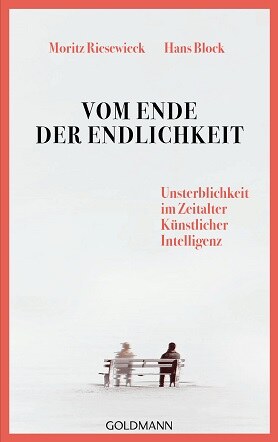Non-fiction
Moritz RiesewieckHans Block
Vom Ende der Endlichkeit. Unsterblichkeit im Zeitalter Künstlicher Intelligenz
[The End of Mortality. Eternal Life in the Age of Artificial Intelligence]
Translation Grant Programme
Published in Italian with a grant from Litrix.de.
The Soul Lives On – Big Data Does Too!
In the nineteenth century, a forensic method for identifying murderers came into vogue: optography – the examination of the retinas of the deceased on which scientists believed they would find negative images of the last things seen by the possible victims. The method soon fell out of favor after being deemed unscientific and failing to produce any concrete results. It was likely employed for the final time in the notorious case of German multiple murderer Fritz Angerstein in the 1920s. Since then, optography has been primarily been of interest to artists.
The End of Finitude by filmmakers Moritz Riesewieck and Hans Block harkens back to this curiosity from the history of science. The human eye, after all, is still very much a focus for scientists, especifically those who wish to use digital “eye tracking” to find out who we are. Such tracking requires sensors like the accelerometers and magnetometers used in the high-resolution cameras in mobile phones, which are capable of analyzing the movements of human pupils that occur, for instance, when we scan website. Where does our gaze come to rest? For how long? What does it skip over? Information like that is of tremendous utility for creating profiles of us as users and tailoring advertising to our individual preferences. That, in turn, requires another sort of modern technology – data analysis.
“For quite some time, autonomously learning algorithms have no longer needed to be told where to look,” Rieseiweck and Block write. “Given suitable data sets, they can identify patterns and contexts human beings themselves would never be able to perceive or conceive of. Not only that. By comparing the data sets of countless users with one another, algorithms can predict proclivities and behavior patterns in individuals in whom those proclivities and behavior patterns have never been specifically observed. The trick for the algorithm is to look for doppelgängers.”
These are not just unsettling advertising techniques in the age of digital advertising. What we find in Riesewieck and Block’s book are new concepts for what makes us individual human beings –to speak in more old-fashioned terms: the soul.
Riesewieck and Block set off on a global, broadly accessible journey, upon which they meet a broad variety of innovators trying to abolish the finitude of human existence. At present there is no remedy for death. But pioneers have been working for years on ways of making at our “soul” immortal, thus filling the void created by the general decline in religious faith. Their approaches run in diverse directions, all of which are at least partially disturbing, no matter how enthusiastically the authors document their efforts.
For example, a young man in Toronto welcomes them into his apartment, where he has long been archiving his entire life on a MEMEX – or memory expansion – device. Every moment of his existence is captured on camera. Names, dates, times of day, places and everything else, including his interview with the authors, is recorded and immediately retrievable with a single mouse click.
The young man hopes both to preserve himself for posterity by making himself undeletable and to overcome the weaknesses of the human psyche. Without technological assistance, people’s memories tend to be selective, incomplete and biased. Our minds are constantly playing tricks on us. There are many psychological experiments that demonstrate how little we should trust ourselves. Thus, it’s good if someone knows us better than we know ourselves. “The sun hangs low and bathes everything in golden light,” Riesewieck and Block write. “When we ask Andrew and Michal when they were last here, Michal looks reflexively over at Andrew, who had already grabbed his mobile phone and opened MEMEX. In no time, he knows the date, time and weather of their last visit to this place. They had read, he reports, for exactly one hour. The title and contents of what they read are already archived in MEMEX. No conversation arises about the book or the last time they were here.”
Data sets are one thing. Modern technologies such as Natural Language Processing software are another. NLP has gotten extremely nuanced, to the point where it can now attempt to generate new statements using genuine recordings of dead people speaking and data sets concerning the “personality” of the person in question. A number of such strange resurrection projects take us readers from Silicon Valley to the bedroom of fanatic nerds who live with their parents in Bucharest. The book lives and breathes with a fascination for technological possibilities, but the authors also leave plenty of room for healthy skepticism.
The End of Finitude concludes not with the abolition of death but with a celebration of the soul, which, despite big data, ultimately doesn’t seem something that can be effectively filtered out. Even twenty-first century people have to trust in the uniqueness of what they do while on earth. No matter how enormous the efforts being ploughed into the extending our presence and distilling out essence, the incalculability of the individuals – which arises from the incalculability of other people and makes interactions among human beings themselves incalculable – continues to be the core of what we call the soul. All the rest can be found in this book.
By Katharina Teutsch
Katharina Teutsch is a journalist and critic. She writes for newspapers and magazines such as: the Frankfurter Allgemeine Zeitung, Tagesspiegel, die Zeit, PhilosophieMagazin and for Deutschlandradio Kultur.


